Welcome to one of my monthly wrap-up posts, where I briefly review everything I read this month! I read widely across many genres, from classics to literary to speculative fiction. With these I’m hoping to shed some light on backlist gems, perhaps push you to read outside your genre comfort zone, and also highlight which new releases are worth your time.
First of all, I know what you’re thinking. Yes, this is almost a month late! There are various reasons for the delay, but one of the major ones is that it took me absolutely ages to read Hild. I planned to write and upload these whilst I was away, and then Hild took over basically my entire trip. I’m not that mad about it to be honest, but I’d prematurely included her in these stack pictures I took before I left, so although she truly belongs in the August wrap-up, she is making an early appearance here. (Take the pictures again, you say? Impossible.)
You’ll also see from the stack that I read the second volume of Gene Wolfe’s The Book of the New Sun in July. I’ve decided I won’t be attempting to review this now until I finish the whole cycle. It just feels too much like I’m in the middle of the story, and seeing as this book particularly seems to rely on everything coming together at the end, it feels pointless trying to evaluate it at this stage. So, stay tuned! I hope to finish it before the end of the year.
the great
Hild by Nicola Griffith
Let’s talk about Hild then, shall we? It’s books like this that make me especially glad I gave up on the star rating system. Does the magic of this book emerge from its pretension and density, or is it hampered by it? I think the reason I’m finding it difficult to answer that is because it’s a little of both.
Inspired by the life of St Hilda—an unusually influential woman for her time—Griffith uses the bare bones narrative that we’ve inherited from Bede’s Ecclesiastical History of the English People and expands it to the tune of five hundred closely typed pages. She plunges us straight into seventh century Britain, complete with vocabulary from its various languages and almost entirely alien ways. Not being a scholar of seventh century Britain myself I can’t speak to its veracity, but my common sense tells me that hundreds—perhaps thousands—of hours of research went into this. It is incredibly immersive, but only with a high level of focus, and a willingness to flip back and forth to the (fairly minimal) glossary. I can see why it was nominated for a bunch of fantasy awards because the world-building is entire and whole, but I would say it’s pretty light on the fantastical elements, reading more like historical fiction to me. It’s fantastical in the sense that the Middle Ages is pretty fantastical to us modern day readers, and sure, Hild was supposed to have been able to prophesy, but the focus here is on a more realistic recreation of her life and times. It just so happens to be very strange.
We follow Hild as she sits uncomfortably, precariously, between a number of powerful figures. Her uncle King Edwin—possibly responsible for her father’s death—relies on her acuity while she is still just a child. Able to follow the patterns of things—the “warp and weft”—of nature and of humans, she is gifted at being able to predict what will happen next (though perhaps rather less magically than her observers would imagine). Her mother, meanwhile, works behind the scenes on her own schemes, trying to keep hers and her daughters’ heads, and maintain hold on the reins of power. Thus follows a long, meandering novel that requires us to keep track of tens of characters with fairly similar names, and the political machinations of this as-yet-disunited isle. I can only assume it’s the politics element (and medieval setting) that had some reviewers comparing it to Game of Thrones. Other than that, they are entirely different in pretty much every single way.
Something else this book has been compared to, and something I thought almost immediately upon starting it, was Mantel’s Cromwell series. Both are incredibly immersive, meticulously researched, and focussed on a particular historical figure. Does Mantel better strike the balance between immersive historical setting and story, providing us with an ultimately more readable set of novels that nonetheless maintain a high level of artistry? Perhaps. But Griffith is working with a much older, more alien culture, and a figure we know even less about. Still, the balance is slightly off, I think. I think there is a version of this novel which is ever so slightly tighter, following the whorls of its plot with a bit more confidence. I also wanted to compare it to Jane Smiley’s The Greenlanders, another ambitious novel that I was at times confused by when reading it, only to come out loving it.
Because in the end, she got me. I was captured by Hild and her world. I felt I knew her, I missed her when she was gone (after complaining it was taking me so long to read). I’ll definitely be reading Menewood, which I didn’t realise came out only recently after a ten year gap! I’m regretting, now, not picking up a copy when I was in the States earlier this year, but I thought yet another book—and a seven-hundred-page one at that—was probably not a priority for luggage space when I didn’t even know if I’d like Hild. Anyway, I’m glad I spent so much time with her, that I really tried to follow exactly what was happening, because I think in the end it made the whole experience more rewarding. I couldn’t recommend this to many people, but it’s worth a try if you like your dense historical fiction.
Embassytown by China Miéville
Have you ever wondered what a language might look like where there is no (or less) slippage between a word and its referent? Where language somehow grasps the physical world? And then, have you ever wondered what might happen when that kind of language met our kind of language? China Miéville has, and he wrote this book about it.
Our narrator Avice lives in the titular Embassytown, an enclave of humans belonging to the nation of Bremen on an alien planet. There are two unique things about this place; one, that it is on the edge of Bremen influence, the edge of empire and also the known world. The other is that the indigenous alien people of this planet, the Ariekei, speak a very unique form of language. It is Capital L Language, and it somehow closes that gap between word and referent, meaning these people can only speak true things. This, though, is a real simplification of the world Miéville creates here, because in reality it is much more complex, each detail adding depth to his themes. The planet is on the edge of the ‘immer’, a “foundational alt-reality”; Avice becomes a living simile so that the ‘Hosts’ (the Ariekei) might be able to express themselves in more ways; the Host Language must be spoken with two mouths and a living soul (whatever you think that means).
Miéville offers us very little foothold at the beginning, dropping us straight into this strange world. It takes a good fifty to a hundred pages just to work out the basics and orient yourself. But it does become more straightforward over time, and there is a good plot waiting for you when you’ve worked out what’s going on. The more I think about this book, write about it, talk about it (we did it for our Moon book club pick), the more intricacy I find. At earlier points in the book it reminded me of some of Le Guin’s science fiction stylistically, but I think Miéville also continues her legacy here in the nuanced and fascinating portrayal of the entanglements between colonialism, power, language and personhood.
My only minor quibble is the pacing, which dragged here and there (there’s an awful lot of formal parties in the first half, though I suppose it is set in an embassy). But really I think if I were to read it again perhaps I would discard even this. It’s a powerful book that is both penetrating in its analysis, but also compelling on a story level. Highly recommended, and if you are a linguist you actually have to read it. It’s the rules.
Minor Detail by Adania Shibli trans. by Elisabeth Maquette
This was a devastating read, and a powerful work of literature. I think I’ve mentioned that I saw Adania Shibli in conversation with Hisham Matar earlier this year at Hay Festival, before I read this book, and it’s a conversation I’ll probably think about forever. (If you sign up for Anytime, you can listen to it here.) It was, in many ways, a good thing for me to come to this book after that conversation as I felt I could much better understand what Shibli is doing in this book, and what her intentions were in writing it. It is short and in many ways deceptively simple, but it is—at least to my mind—exquisitely crafted.
The first part is based on a true story and is about the rape and murder of a young Bedouin girl by Israeli soldiers in 1949. The second part follows a woman who becomes obsessed with this ‘minor detail’ from the archive (as the real story was when it was rediscovered both within and without the book), and sets out to try and find out more about the girl and her perspective. A futile gesture, of course, in the face of catastrophic erasure.
There is a big stylistic shift across the two parts. In the first part the reader tracks the minute details of the leading soldier’s life in the Negev desert. His meticulous ablutions (undermined by the fact of his allowing a scorpion bite to fester), his pointless excursions out into the seemingly empty desert. The big action seems to exist just outside the words themselves, more devastating when the girl enters the narrative. The circularity of his activity, the ceaseless mechanics of his routine, are disrupted only minimally during the emotional height of the novel.
Then the second part. This is a first person narration by the woman herself. Now, the words spill out. There is indeterminacy, chaos in her story. Shibli talked a little about this in the interview. How she felt that as a Palestinian she was always stuttering against the grand narrative of Israel. The second half of Minor Detail does indeed have this sense of profusion and confusion compared to the straightforward first half. And it describes, too, the pain and slow degradation of life under occupation. Of course, the big things; the loss of life, the mutilation, the ceaseless thunder of bombs. But also the small things, the minor details. The dust that covers a work desk after a bomb, because of course the windows had to be open so they wouldn’t shatter. The constant mental load it takes to work out which area you can get to with which pass when you live under an apartheid regime. As the narrator seeks to find out more about the lost girl, she begins to cross some of these uncrossable boundaries.
On one hand we have a whole life of a murdered girl which becomes just another minor detail, another number. And yet on the other we have the actual minor details that have a cumulative grating effect, on one’s sense of self, on one’s narrative, on one’s sense of place. I think this book will stay with me for a long time.
My Death by Lisa Tuttle
Like many reviewers before me, I reiterate that it’s best to go into this short novel without too much information. Briefly, it’s about an author who decides to write a biography of a forgotten female artist, only to find their lives uncannily intertwine. We discussed this for book club, so if you’ve read this and want to know more of our thoughts about it, you can always join and watch back the recording. We had a lot of fun with it!
Overall I really enjoyed comparing this one with Possession by A. S. Byatt, which we read for book club at the end of last year. They are very different stylistically, but both examine “the romance of the archive” (as Amy Gentry calls it in the NYRB introduction) and some similar themes, though in entirely different ways. I’d go so far as to recommend you read them together for a really fruitful reading experience. Also I need more books about researchers falling down literary and artistic rabbit holes, please.
Without giving too much away, I recommend this one. I don’t think it will appeal to absolutely everyone, as Tuttle is insistent on not providing clear answers, but I think that is half of the fun of this unusual piece of work.
the good
Doppelganger: A Trip into the Mirror World by Naomi Klein
Naomi Klein had (has?) a doppelgänger problem, in that she kept getting confused for conspiracy theorist Naomi Wolf online. Wolf describes herself as a liberal, and did write the feminist book The Beauty Myth in the nineties, but since COVID has adopted some rather ridiculous and dangerous beliefs, starting with being anti-mask and anti-vax, and finding herself now in decidedly right-wing spaces. Klein uses this confusion—the fact of having a doppelgänger—to explore the contemporary world more widely, namely the polarisation of politics, the seemingly strange alliances that have formed in some of these spaces, and what those on the left can do about it. It is an incisive look at now, and helped me make sense of a lot of what we see online. She covers a huge range of topics from wellness culture, to personal branding, to the project of Red Vienna, to our cultural understanding of autism through history, to Palestine and Israel. And it all comes together well under her central theme of the doppelgänger. I’ve thought about this a lot since I finished it, and I recommend it!
the solid
The Book of Love by Kelly Link
I said it in my recent video and I’ll say it again, I have no idea who I’d recommend this to. It is six hundred pages of the minutiae of teenage angst, with a little magic thrown in. Whilst there is a Linkian playfulness to this book which does remind me of her other work, in other ways it is not what I would have expected from her at all for a first novel. We follow four teenagers who have been brought back from the dead and must compete against one another (at what? we don’t know) so that two of them may stay in the land of the living and avoid being sent back. I listened to this which is a good thing as I don’t know if I could have justified the time investment if I’d been properly reading it. And yet, and yet, by the end I was kind of invested? I don’t know if it was the sheer number of minutes I listened to, but I came to care for these characters. There’s no doubting that they are wholly and completely realised, but also… they’re kind of annoying. And the plot is definitely secondary to the inner workings and interpersonal relationships of these teens. One for the Kelly Link completists, perhaps. I don’t think it’s a bad book I suppose it was just, not for me? And I didn’t exactly know what the point of it was, which both frustrates and intrigues me.
Disoriental by Négar Djavadi trans. by Tina Kover
This novel is told to us by Kimia Sadr, an Iranian woman who has lived in France since she was a child. She is sitting in the waiting room of a fertility clinic, and whilst she does so she tells us, the reader, about her family and life up to this point. She had activist parents who ultimately had to flee the Iranian Revolution (though they were critical of both what came before and after), and she finds herself in the in-between identity of immigrant; now neither fully Iranian nor fully French, hence ‘disoriental’. The writing style is lively; Kimi explicitly directs the readers attention and signposts her storytelling techniques, and it is by turns humorous and morose.
I couldn’t help but be a little disappointed by this one. I think at times the style got in the way of the emotional core of the novel. And by the time we got to some plot revelations that had been heavily foreshadowed, the narrative surprise was worn out. With Djavadi being a screenwriter, I was intrigued by the overlap with Martyr!’s cinematic elements which I read last month. Both writers employ this multimedia-esque style. For whatever reason Akbar’s just spoke to me that little bit more (perhaps a translation issue and it overall works better in French, as this review suggests).
There were some parts I couldn’t really parse due to my own ignorance. I don’t know how an Iranian reader would find this book, and whether they would consider it too much written for a Western audience (it was certainly very explicatory). Of course this may not be the case, but it’s something I’m aware I don’t know the answer to. I also thought some of the central theming of gender and motherhood and fertility was a bit of a distracting choice, and wasn’t entirely fleshed out.
However Disoriental is a solid book, and there are things to like about it (in fact, many people really love it!) At no point was I keen to abandon it, and I wanted to see what happened in the end. I certainly think some of the storytelling, particularly the descriptions of Kimi’s forebears, was especially engaging. But I don’t know that it’s one that I’ll think a lot about moving forward.
Thanks for reading and if you got this far, congratulations! If you enjoyed this, you can read last month’s round-up here.
You can also join our book club here. I’m biased but it’s one of my favourite corners of the internet, and I’ve read countless fantastic books I’d have never known about through recommendations from our members. Not to mention our monthly book club discussions, which always leave me with a much greater understanding of whatever it is we’re discussing. At the end of August we will be meeting to discuss Elena Knows by Claudia Piñeiro.
I look forward to seeing you next month!


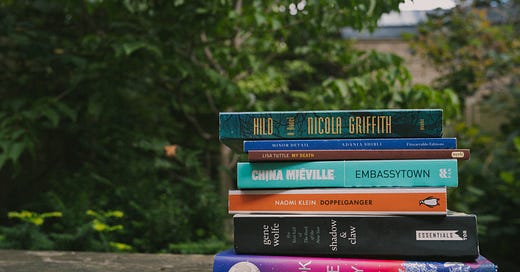



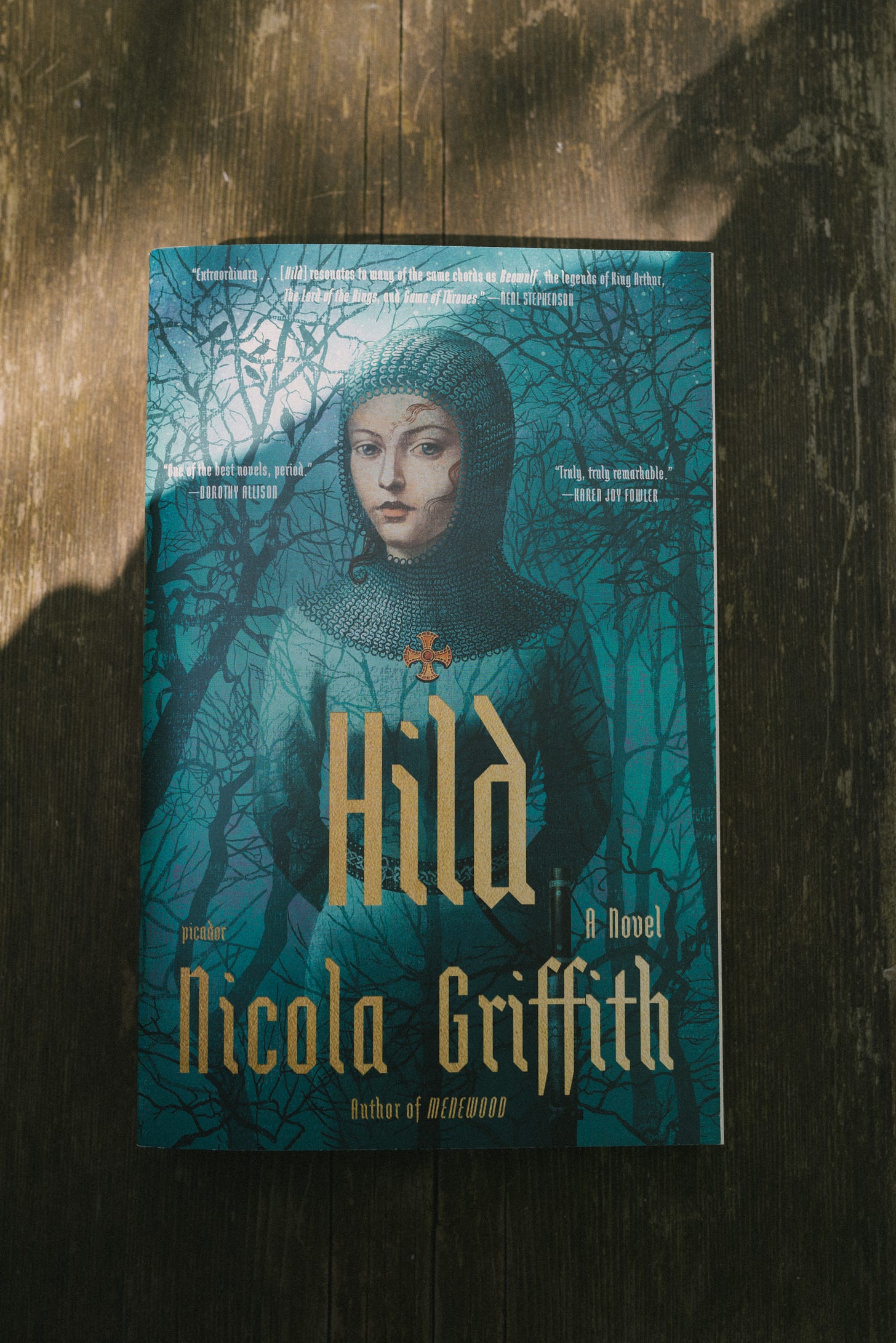

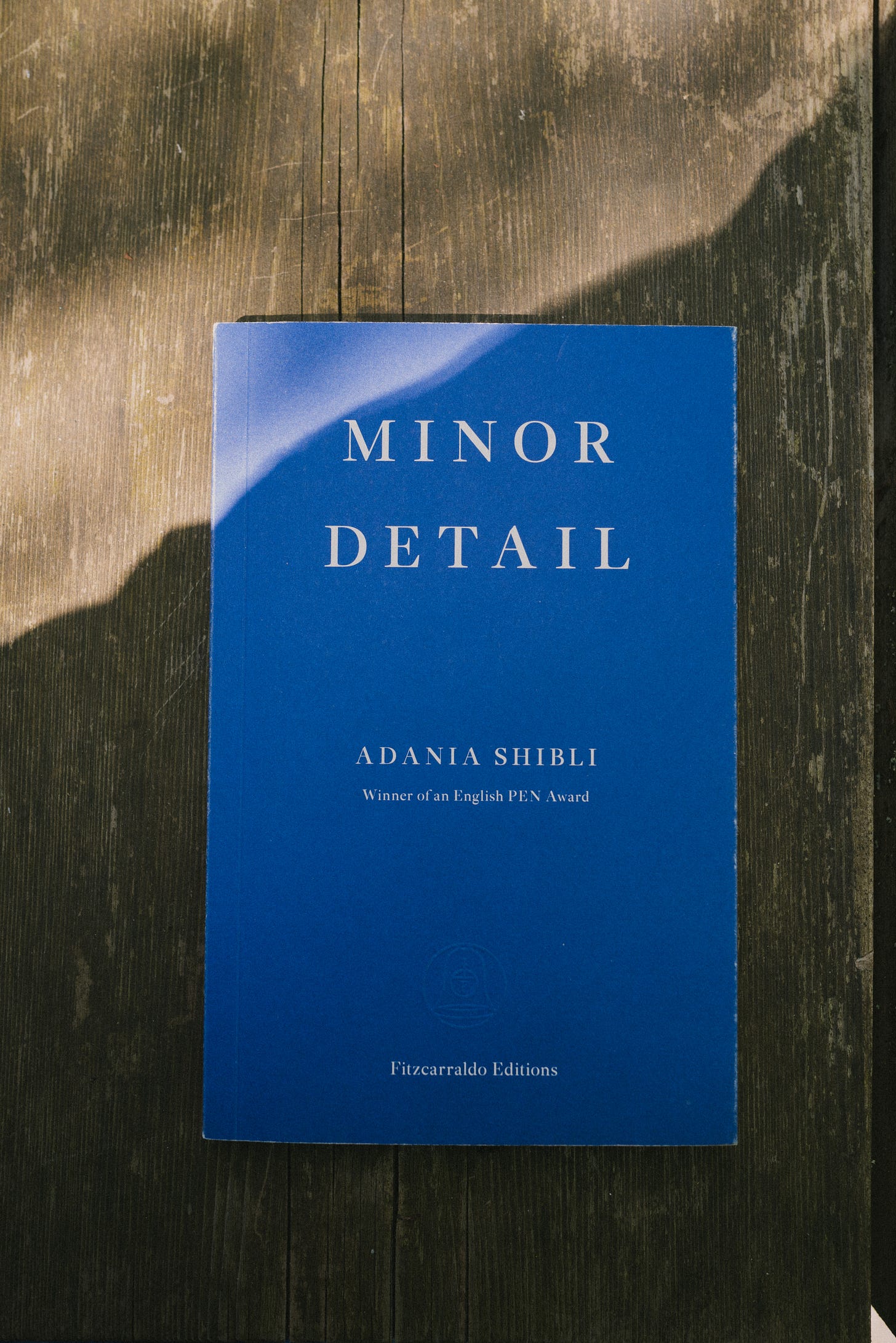
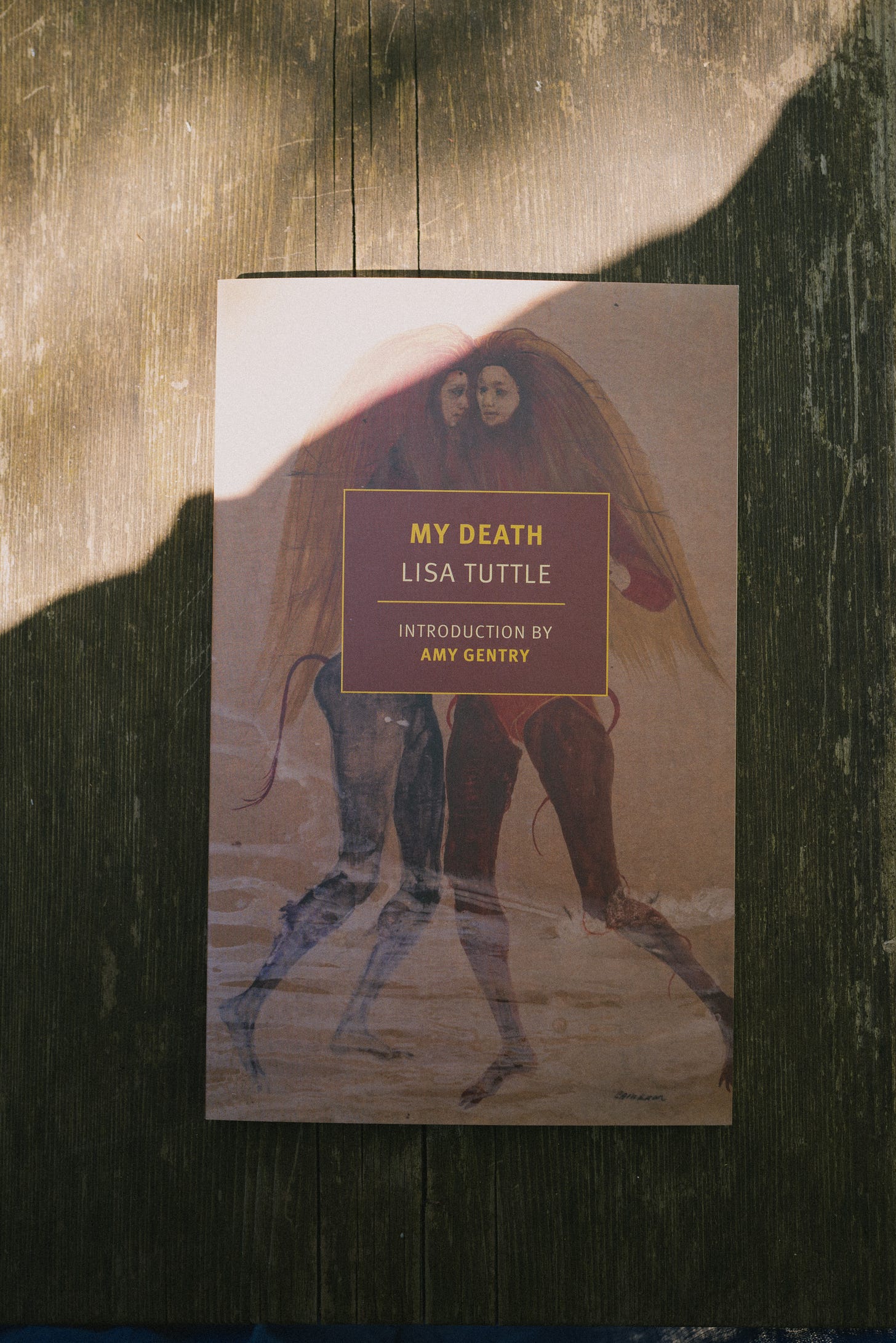
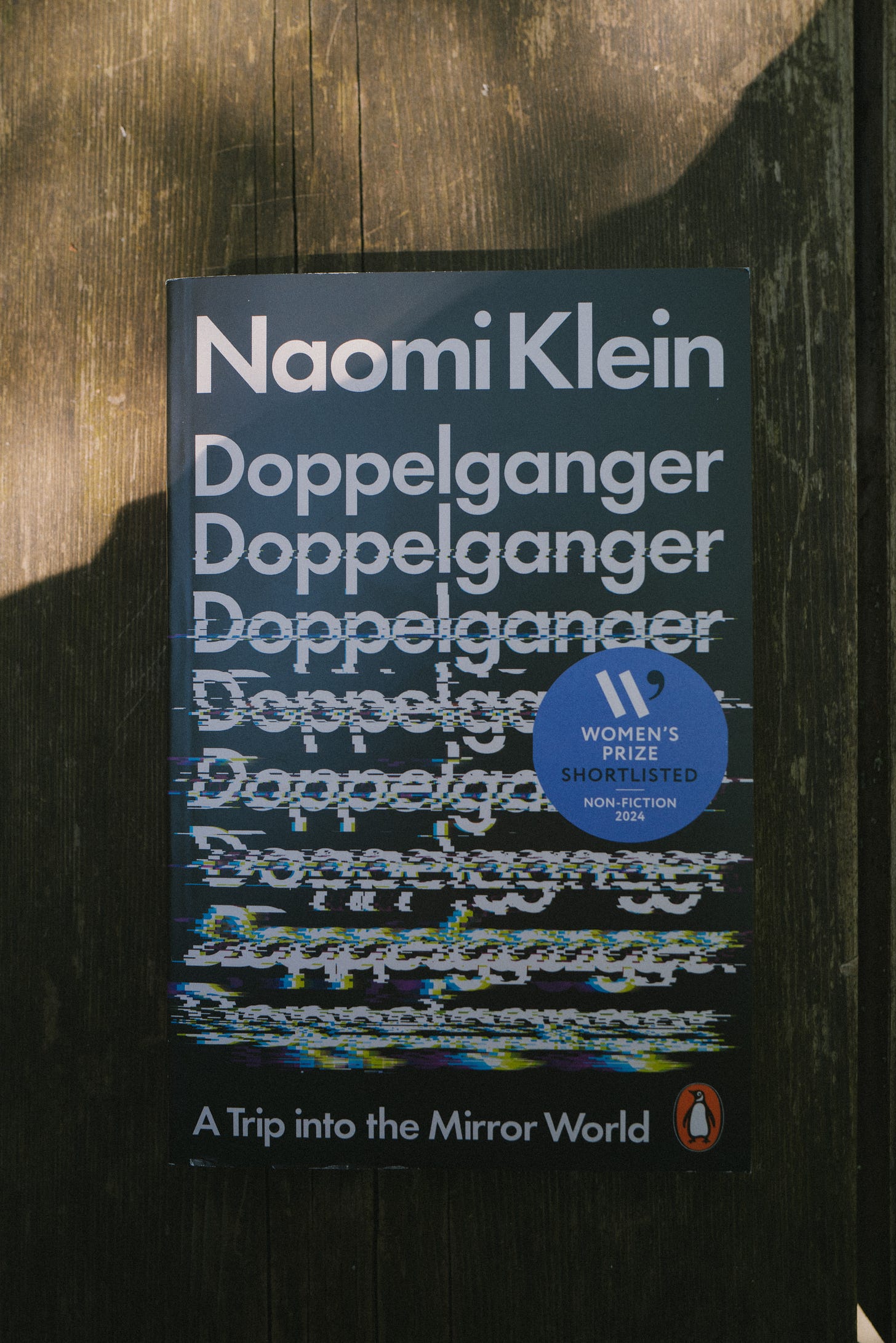
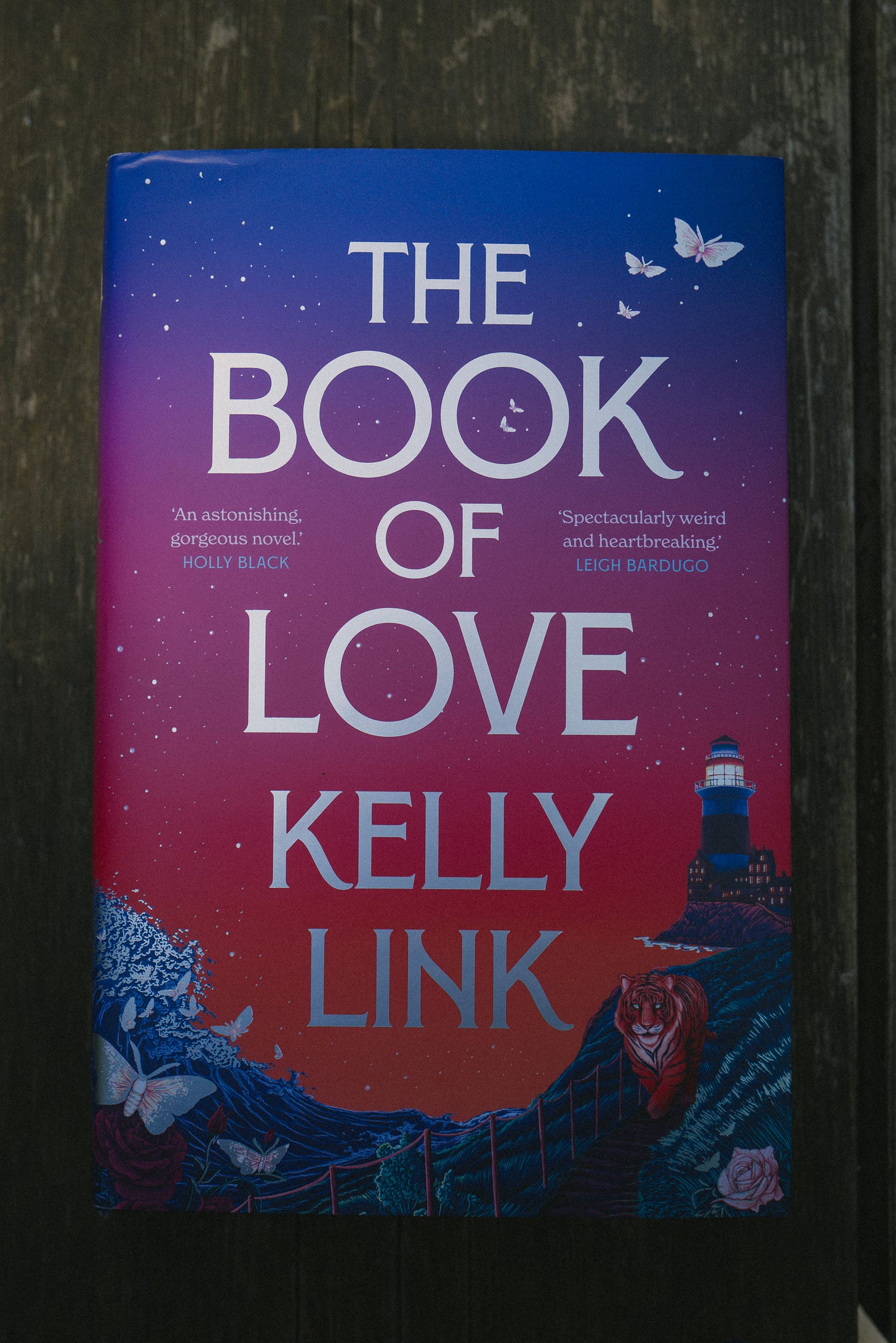

I love how in depth your reviews and thoughts are! I’d love to be better about using my reading journal so I can provide more detailed thoughts myself 🥰🥰
Really enjoyed reading My Death for book club! I've been seeing so much praise for Embassytown on the discord channel and other people's reviews. It's making me quite intrigued! Also, I hadn't heard anything about Hild before but I might investigate this one a little further.